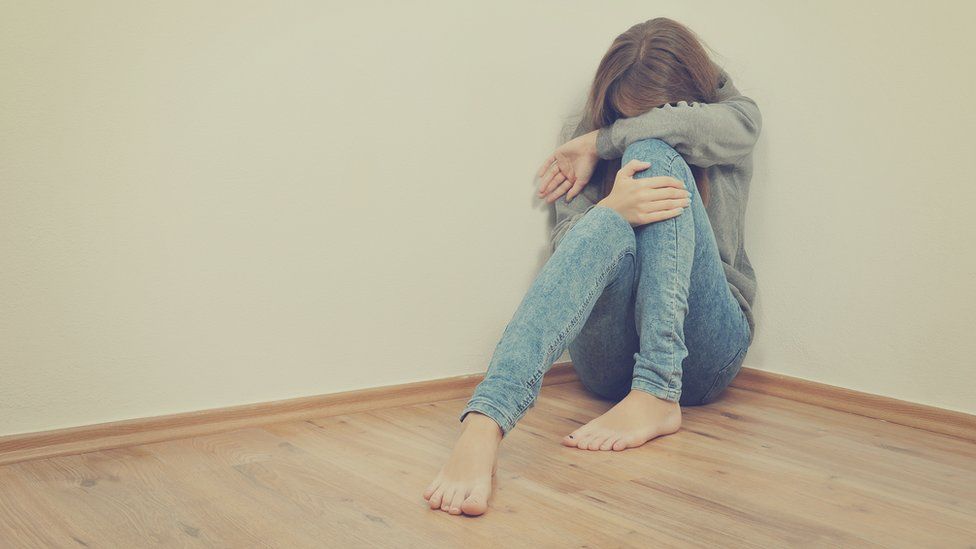Suicide: Russian girl's death prompts national debate
- Published

It's a day like any other day in a provincial city in central Russia. A 12-year-old girl is getting ready to go to school. Suddenly her phone rings.
The next minute she is out of the door, saying she's meeting a friend and they will go to school together.
Later the same day, when her mother turns up at the school, there is no sign of her daughter.
No-one has seen her.
Then the mother's phone rings, and she can tell by the ring tone that it's her daughter's phone.
"Where are you, darling?" she asks with relief.
"It's not your daughter," a strange voice replies. "I'm a doctor from A&E. Your daughter is dead."
She had taken her own life.
Social network subculture
In the weeks and months that followed, the mother discovered how her daughter had been immersed in an online subculture of suicide involving images of self-harming, alternative reality games and a cult surrounding a 16-year-old girl who had killed herself in a violent fashion.
This is the tragic story at the heart of a long, front-page article called Groups of Death in independent newspaper Novaya Gazeta on 16 May.
Written by correspondent Galina Mursalieva, it alleges that Russia's most popular social network VKontakte (VK) has numerous groups used by Svengali-type figures to encourage vulnerable young people to kill themselves.
These groups are regularly closed down, but others quickly spring up in their place.
Emotional intensity
The piece claims that a spate of at least 80 recent suicides can be linked to these online groups. Four of the deaths, including the one described above, occurred on the same day last December and in roughly the same manner.
A note from Novaya Gazeta's editors at the top of the article urges every parent to read it to "save their children from a fateful step".
Groups of Death has had an extraordinary impact. In little over a week, it has been viewed more than two million times and has sparked a stormy debate on social networks and beyond.
One of the reasons it has gone viral is undoubtedly the emotional intensity of Galina Mursalieva's writing. But that has been singled out as one of its main shortcomings, too.
Critics have accused her of treating a complex subject with tabloid sensationalism and allowing her personal involvement in the story to cloud her judgement.
In particular, they question the emphasis that the writer and the bereaved parents have placed on the internet as a cause of juvenile suicide.
A follow-up investigation by the Lenta.ru website presented a more nuanced, although no less disturbing, picture of internet subculture.
It suggested that the people running the VK groups were not much older than their teenage members, and in many cases were exploiting suicide cults to boost their own egos or even earn money from online advertising.
But Lenta.ru also admitted that at least some of the deaths mentioned by Novaya Gazeta could be linked to online grooming.
Russia's high level of youth suicide
- Russia has world's third-highest number of suicides among adolescents
- Depression, anxiety and aggression are found in 20% of Russian teenagers; the Western average is no higher than 5%
- Suicidal thoughts come into the minds of 45% of Russian girls and 27% of young men
- Most suicides are linked to parents' alcoholism, family conflicts and abuse
- Statistics agency Rosstat says Russia's overall rate of suicide fell in 2015 to the lowest level for 50 years
Source: Unicef 2011/Rosstat 2016
As well as appealing to parents, Novaya Gazeta also argued that it had wanted to goad the authorities into action. It said it had passed material to law enforcement agencies and informed media watchdog Roskomnadzor of its findings.
Since publication, investigators in St Petersburg have launched a criminal case over groups on VK that allegedly promote suicide.
But Novaya Gazeta has also been accused of colluding with the authorities, or at least giving them a useful pretext to further extend their control over the internet. It is an allegation emphatically denied by chief editor Dmitry Muratov.
One of the ostensible aims of a controversial internet blacklist law that came into force in 2012 was to protect minors from material promoting suicide.
Internet expert Anton Nosik believes that the Kremlin is now intent on getting to grips with online communities, having passed laws that have the potential to curb the activity of top bloggers and with key elections just around the corner.
One thing that everyone appears to agree on is that adolescent suicide is a very serious problem in Russia. A 2011 Unicef report found that the country had the third-highest suicide rate in this age group in the world, more than three times the global average.
As such, even some of Galina Mursalieva's critics concede that by getting people to talk about a subject that is too often ignored, she may have performed a useful public service.
Are you affected by this?
Samaritans
The Samaritans helpline is available 24 hours a day for anyone in the UK struggling to cope. It provides a safe place to talk where calls are completely confidential.
Phone for free: 116 123
Email: jo@samaritans.org
Papyrus
Papyrus offers support, practical advice and information to young people in the UK considering suicide and can also offer help and advice if you're concerned about someone you know.
Phone: 0800 068 41 41
Telephone Doveriye (Telephone of Trust)
In Russia, a confidential hotline for children is available on 8-800-2000-122
BBC Monitoring reports and analyses news from TV, radio, web and print media around the world. You can follow BBC Monitoring on Twitter and Facebook.
- Published13 May 2016
- Published25 May 2016
- Published6 March 2023
- Published14 April 2015
- Published27 January 2016